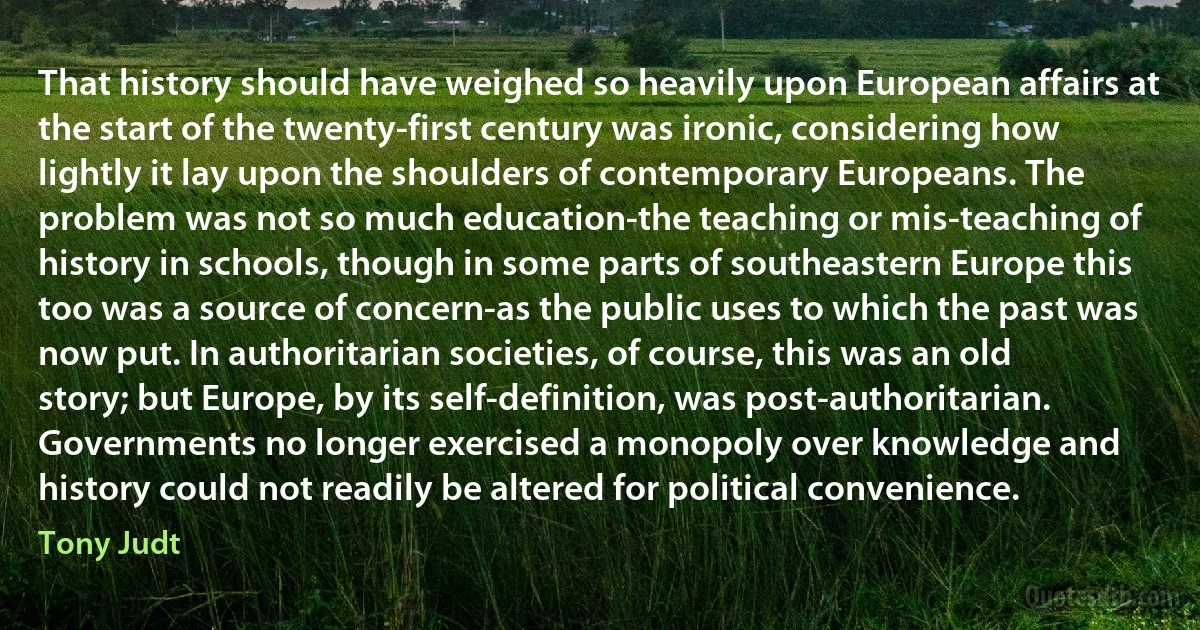
That history should have weighed so heavily upon European affairs at the start of the twenty-first century was ironic, considering how lightly it lay upon the shoulders of contemporary Europeans. The problem was not so much education-the teaching or mis-teaching of history in schools, though in some parts of southeastern Europe this too was a source of concern-as the public uses to which the past was now put. In authoritarian societies, of course, this was an old story; but Europe, by its self-definition, was post-authoritarian. Governments no longer exercised a monopoly over knowledge and history could not readily be altered for political convenience.
Tony JudtRelated topics
century considering contemporary course history knowledge lay longer monopoly now past problem public should source start story teaching affairs twenty-first authoritarian parts usesRelated quotes
What is a charitable heart? It is a heart which is burning with love for the whole creation, for men, for the birds, for the beasts ... for all creatures. He who has such a heart cannot see or call to mind a creature without his eyes being filled with tears by reason of the immense compassion which seizes his heart; a heart which is softened and can no longer bear to see or learn from others of any suffering, even the smallest pain being inflicted upon a creature. That is why such a man never ceases to pray for the animals ... [He is] ... moved by the infinite pity which reigns in the hearts of those who are becoming united with God.

Isaac the Syrian
...the French business is no light or trivial thing, or such as has commonly occurd in the course of political Events. At present the whole political State of Europe hinges upon it. On the Continent there is little doubt; every thing will take is future shape and colour from the good or ill success of the Duke of Brunswick. In my opinion, it is the most important crisis that ever existed in the World. ... My poor opinion is, that these principles...cannot possibly be realized in practice in France, without an absolute certainty and that at no remote period, of overturning the whole fabrick of the British Constitution.

Edmund Burke
The only platform from which public exposures can be made is an all-Russian newspaper. "Without a political organ, a political movement deserving that name is inconceivable in modern Europe."In this connection Russia must undoubtedly by included in modern Europe. The press has long ago become a power in our country, otherwise the government would not spend tens of thousands of rubles to bribe it, and to subsidize the Katkovs and Meshcherskys. And it is no novelty in autocratic Russia for the underground press to break through the wall of sponsorship and compel the legal and conservative press to speak openly of it.

Vladimir Lenin
Eric's not retiring from television entirely, but only from daily journalism, and that means, of course, this broadcast. It's not only his beautifully-chosen words of wisdom that we shall miss - to this newsman, he's one of the finest essayists of this century - but we shall also miss our almost daily contacts with him in the pursuit of our craft, in which his rare insight and unswerving integrity were a constant source of professional guidance. And yes, it's also true that we shall be the poorer in our self-esteem for no longer being able to call him "colleague," but that's the way it is: Wednesday, November 30, 1977. This is Walter Cronkite, CBS News; good night.

Walter Cronkite
The nineteenth century moved fast and furious, so that one who moved in it felt sometimes giddy, watching it spin; but the eleventh moved faster and more furiously still. The Norman conquest of England was an immense effort, and its consequences were far-reaching, but the first crusade was altogether the most interesting event in European history. Never has the western world shown anything like the energy and unity with which she then flung herself on the East, and for the moment made the East recoil. Barring her family quarrels, Europe was a unity then, in thought, will and object. Christianity was the unit.

Henry Adams
